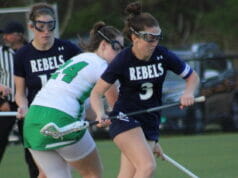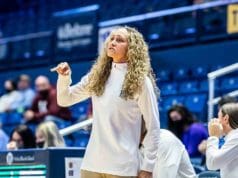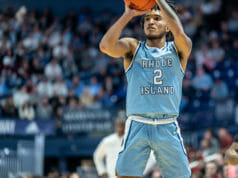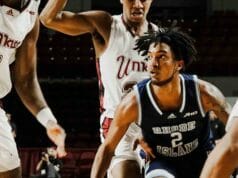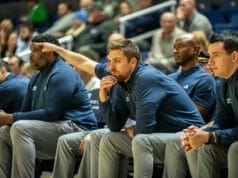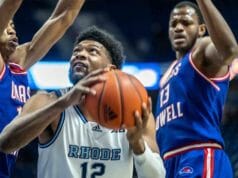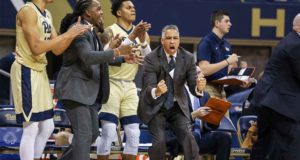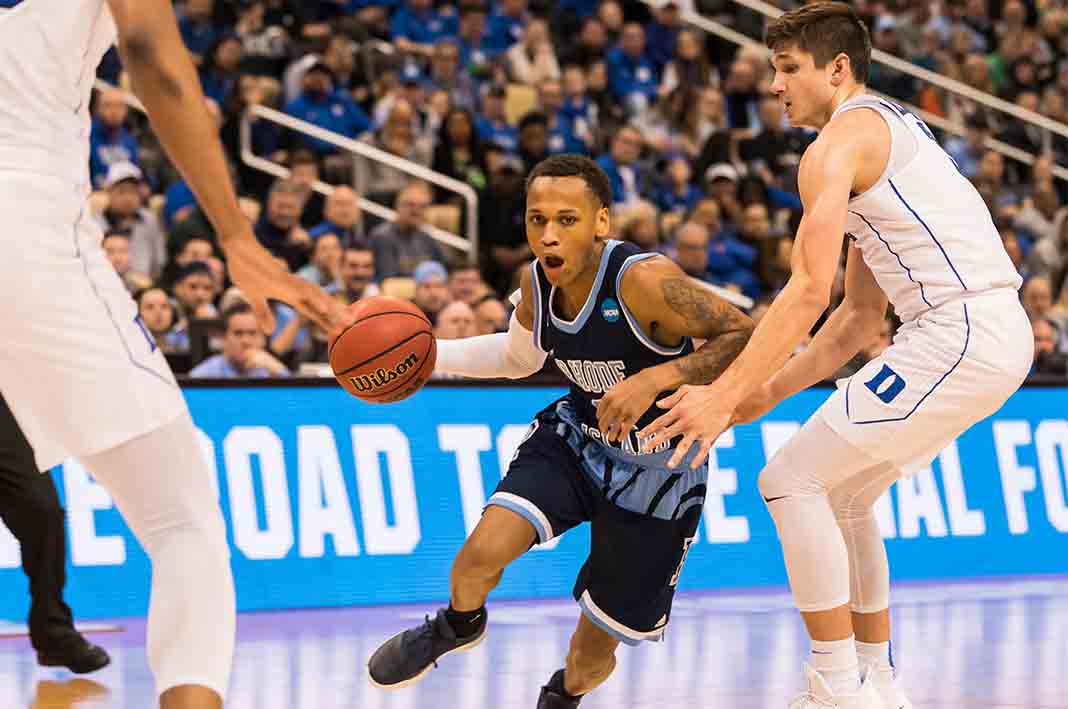
From the moment he stepped on campus in Kingston, Daron “Fatts” Russell has brought electricity and a fearless style of play to the Rams lineup. In a shade under 18 minutes per game last season as a freshman, Fatts averaged 7 points per contest, carried nearly a 2-to-1 assist to turnover ratio (53 to 27) and played his biggest in some of the season’s most massive moments.
As he enters his sophomore season and the dual weight of leadership and production shifts to him, Atlantic 10 analyst and Yurview contributor Chris DiSano caught up with the 5-10, 165 pound guard to discuss a slate of topics.
Chris DiSano: Practices are now underway, but let’s rewind briefly for a few thoughts. When there is a coaching change there’s often a period where the new head guy in town essentially has to re-recruit players. What was it, and is it, about Coach Cox that gives you a sense of comfort?
Fatts Russell: That stretch between when Coach Hurley left and when Coach Cox was hired was a very tough time. Coach Cox constantly was talking with me and sharing what his continued vision was for me here. I had a lot going on in my mind, but the way that Coach Cox approached everything and attacked the situation was like no other. I believe in him and what we have here.
CD: What’s one aspect of Coach Cox’s coaching personality worth sharing?
FR: Coach Cox is a little more of a players’ coach. He tells us what we need to hear but gives us confidence. He’s a very good player development coach and is big on that… and he’s a loving guy. He’s a laid back person and the type of guy you could talk to about anything.
CD: What were the primary off-season areas of emphasis for you?
FR: I worked a lot on my jump shot and trying to become more consistent. I’m a good shooter, form-wise, but sometimes I’m very streaky with my makes. Shout out to the managers and guys who have rebounded for me (laughs). I worked non-stop on that part of my game. But also working to become more of a leader… With our seniors being gone I’ve had to step up into more of a leadership role. And sometimes being a leader is also understanding when to follow… We have great guys like Jeff [Dowtin] and Cyril [Langevine] who are vocal and lead, so it’s understanding when to choose my spots, knowing we have others like those two guys also.
CD: You mentioned a couple of the upperclassmen leaders on this team this year; in thinking about the guards who left, can you share some lessons they imparted upon you during their time here?
FR: JT [Jared Terrell] and EC [Matthews] taught me what is expected as you move into a role where you help lead the team. Jarvis [Garrett] and Stan [Robinson] taught me about how to be a better person off the court and also how to be unselfishly selfish. That sounds weird but it’s about knowing when you need to step up and take the shot, but at the same time understanding that if you have a good shot but can get a teammate a better one… you’ve gotta make that pass.
CD: How important is filling the leadership void?
FR: It means everything because the seniors are gone and they were tremendous leaders, all five of them. So by losing those guys it forces Jeff, Cyril, and me to step up. No team is going to be what it could be unless it has great leaders, so that’s the most important part for our team this year. To have guys step up and fill in those roles as best as possible.
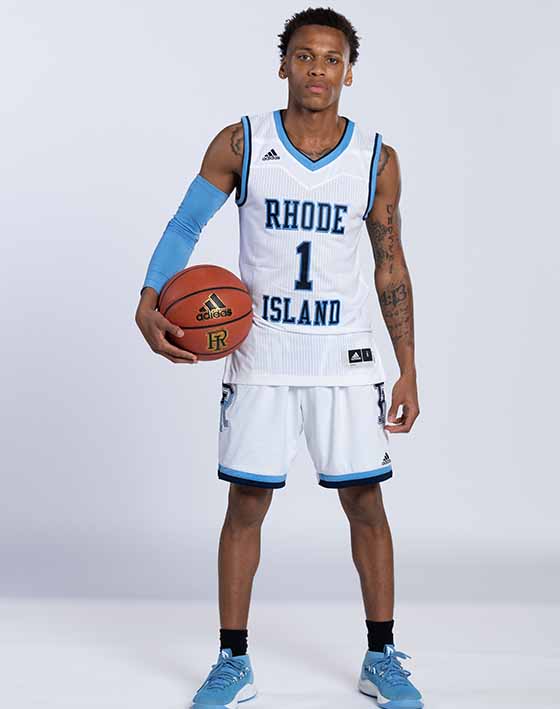
CD: What’s an unknown or underappreciated area of your game that you feel is a strength?
FR: People have this idea that I’m a small two-guard, but I’ve played point guard my whole life. I’ve always worked to make my teammates better and that’s one of, if not the, most important part of my game. Last year I had to fill a role where I had to be an aggressive, scoring type to come off the bench and give us a spark. But my whole life I’ve been playing point guard, so getting people involved and leading the team is something I’ve always had in my game.
CD: I know that comments from critics sometimes find their way to you. Comments like “Can he take 40 minutes of physicality versus only 18 a game he played last year?” Beyond letting your game do the talking, what do you make of them?
FR: It’s very motivating. I see the comments on social media and sometimes I even screenshot them, take them and use them as motivation. It gives me the extra push to continue chasing my dream.
CD: What did you learn from being the hunted last season that will prepare you to tackle a new year with new teammates and expectations?
FR: That’s a great question. I learned to never take plays, moments, or games off. I feel like all year we only took one game off – the Saint Joe’s game, because there was a lot of emotion with Senior Night in that game. But otherwise, we approached every other game with the same mindset. Every team is capable of beating you in college basketball and you can never relax, take a game off, and get comfortable.
CD: What is the biggest adjustment you remember in transitioning to the college game?
FR: It was a number of things. The physicality and speed of the game is way quicker, way different than high school. It’s something that takes time to get used to. Also the importance of every game… Every game means something. The game in mid-November can impact you in March just as much as the one in February.
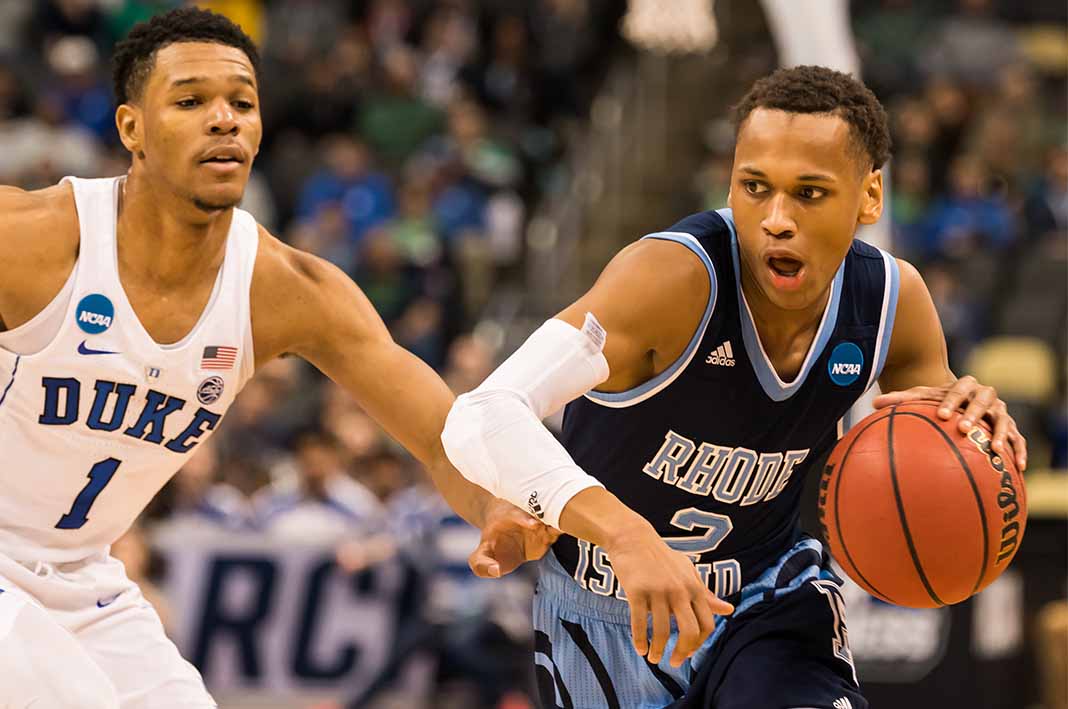
CD: That’s a good segue for this one… what specific teachings have you relayed to the new crop of freshmen?
FR: I talk with them all the time about the importance of each possession and to be in the right spots within those possessions. You can never rest because at any given time you can get back door cut or fall asleep and your man can hit a three. The pace of the game is much faster but you have to figure out a way. Practice is helping them so they can make mistakes and learn from them… but you never truly know and understand until you get out there in a game.
CD: Can you share a sentence on each of the freshmen, maybe something you didn’t know about their games before, but now appreciate. This is framed understanding that you’ve only had a few days with freshman Aris Tsourgiannis?
FR: Jermaine Harris – He can really shoot it. I didn’t know he could shoot it that well.
Tyrese Martin – I feel like he’s ready to impact us right now. He’s been putting in the work, is super athletic and does so many things on the court.
Dana Tate – I think he’s going to have a great year for us. He’s physically imposing and skilled.
Omar Silverio – He’ll be a great scoring option for us because he can really shoot it and handle it.
Aris Tsouragiannis – He’s just gotten here so it’s tough for me to say too much right now, but he’s skilled.
CD: From both and team and individual standpoint, how do you measure success this year?
FR: As a team, I feel like we can finish in the top of the conference and can make it into the NCAA Tournament. We don’t look at this year being an ‘off year.’ We have the talent in the gym. We should pick up from where we left off. I know there will be ups and downs and we’ll have times where we might struggle and be challenged. For me personally, I want to be in the running for the A-10 Player of the Year and a 1st team caliber player. I don’t put limits on myself.
CD: Finally, not including coaches/teammates, who do you lean on to help you in life and with your game?
FR: I have two people that immediately come to mind. First, my stepfather, Tahar Sutton. I talk to him constantly about how to improve my game because he’s my trainer back home. I lean on him for advice, how to improve my game, everything. I show him clips sometimes and he’s shares his knowledge. The other is my uncle in Arizona. He does many of the same things for me. He helps me keep my confidence high. He actually is the one who put the ball in my hands way back when.


